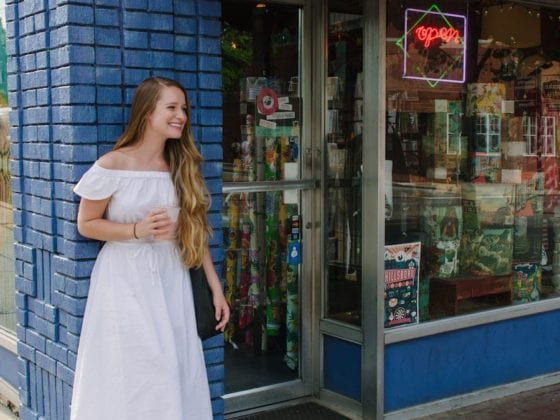Recently, I’ve wondered: Is it socially acceptable to admit to having a bad day?
Saying that I am, in fact, having one has always felt like an admittance of fault – a depiction of the ways I am not measuring up to the seemingly societal norm of perfectionism. Not only that, but I’ve generally found that most are drawn to happy, smiling people. We tend to avoid those readily armed with complaints or sullen looks.
Presenting our happiest and most put together self is an often-stressed social pressure. The popularity of social media perpetuates the ability to craft an exciting life while snipping out all the negative details we would prefer to keep hidden. Instead of acknowledging our perfectly natural sways in moods or actions, we are compelled to post the ideal Instagram picture of ourselves tan at the beach or reply enthusiastically with “good” every time someone asks how we are.
Having a bad day is inevitable – we are prone to them simply by our human nature. With this in mind, I pondered techniques one could use to make the most of the bad day that will undeniably strike, whether that means ignoring it or relishing in it.
Having a bad day is inevitable – we are prone to them simply by our human nature.
Remind yourself that every moment is an opportunity for the day to get better. When I am in the midst of a bad day, I do several small things to try to self-induce joy. I get my favorite drink at Starbucks. I’ll give myself the okay to buy new blush instead of commanding myself to be frugal. For you, maybe it’s taking time to go on a short walk or writing down the things that are upsetting you as an avenue to vent, or creating a list of things you are grateful for to redirect those emotions in a positive direction.
Admitting you’re having a bad day is one thing, but that doesn’t necessarily mean that the whole day will be ruined in its entirety. Even if that means staying up late to watch an episode of Friends at the end of the night, find a small sliver of joy and soak it up. While you may have had some bad moments, by actively working to implement positivity and searching for opportunities to turn your seemingly dire situation around, you can end the day well.
You have three options for further dealing with a bad day: Relish in it, admit it, or ignore it.
1. If you are going to relish in your bad day, that means sulking. Staying in bed, putting your headphones in and ignoring those around you, possibly shedding a few tears. While it might not be the most productive option, I think it’s still allowable to have days go wrong where you acknowledge the wrongness. By admitting a lack of control over situations gone awry, you can feel a sense of release.
You might have done everything you could have for things to go right, and yet somehow they didn’t. It’s out of your hands; allow yourself some frustration for the day, if that’s what you need to do to get through.
2. On another hand, admitting to others that you are having a bad day can bring on support and understanding. Maybe one of your friends or coworkers has some advice that will make you feel better, or maybe your boss will be more understanding if you don’t have a smile plastered on your face. Who knows, maybe even the simple act of admitting to feeling a little off will lighten your mood.
By admitting a lack of control over situations gone awry, you can feel a sense of release.
3. Now, my personal forte, ignoring your bad day. If you wake up on the wrong side of the bed, consider how you might power through it. This doesn’t necessarily mean pretending bad days never affect you, or joining the masses that tailor their social media profiles to be less than authentic. Ignoring the toughness of your day can ensure that it doesn’t consume you; by forcing yourself to keep moving forward, you open yourself up to a higher possibility of a turn-around.
You may still have to go through a series of deep breath exercises to calm down or go home and sob while watching Marley and Me, but forcing a smile has the potential of softening the bad just enough so that the day doesn’t develop into an even worse one.
Tell yourself (and maybe others) that this is not reflective of your normal behavior. Don’t be too shy or proud to apologize for when you snapped at your mother over the phone, or for being too selfish to make a new pot of coffee after taking the last cup. You are upset, and you aren’t acting like yourself — it happens to every human being on the planet. Try to remind yourself of the hundreds of other good days that you’ve experienced, and the hundred of other good days to come.
Today is just one day, and even though it may have been different than what you planned, the sun will yet set and rise once again.
Image via Tory Rust












3 comments
The way I approach it is that there really isn’t a full bad “day” per say. Just a few brief negative episodes or events that didn’t go your way. So if you just categorize them as such they can be contained and dealt with accordingly. Because if you tell yourself you’re having a bad day I believe you will then put that negativity out in the universe and attract more unwanted negative situations to occur. Also, if I think about or see the poor man or woman on the freeway off ramp with nothing and no one, in their torn and ragged clothes, I give them some money and say God bless you (they actually say it first), then it’s not so bad of a day after all. We could all be so much worse off. #Compassion.
Reminding yourself that this is just one day is so important. Dwelling on it or hiding it just makes it worse. Accepting that you’re having a bad day is much more effective.
I get pretty snappy on bad days, so if I can, I just try to sleep it off. I can never get enough sleep anyways 😛 -Audrey | Brunch at Audrey’s